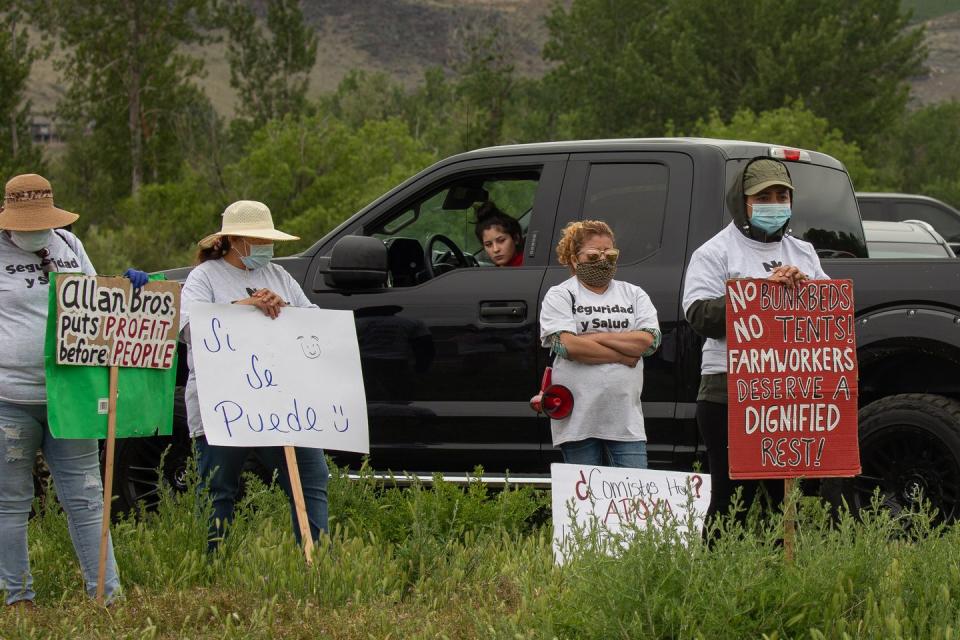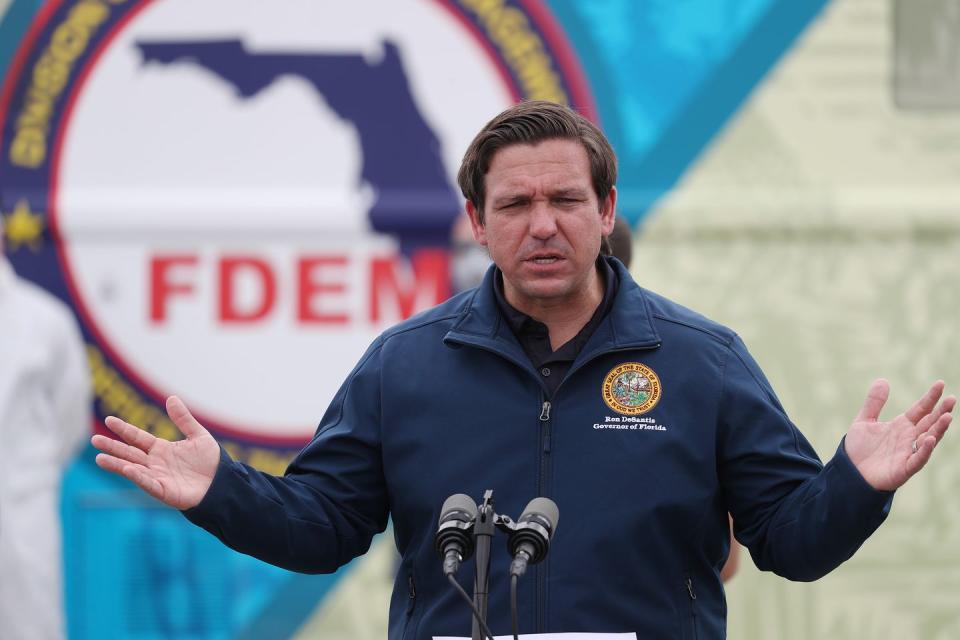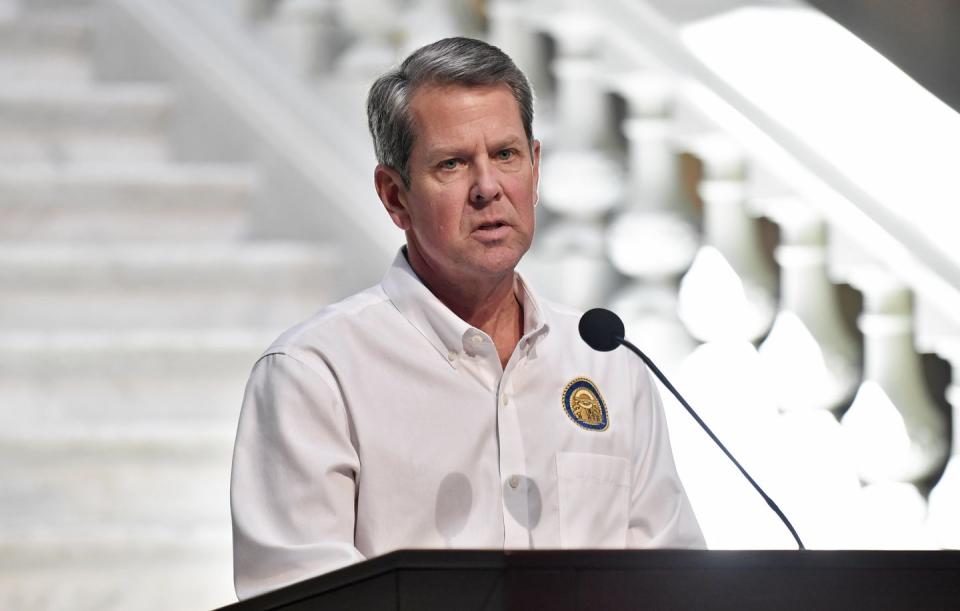An Illinois State Lawmaker Believes the Freedom to Infect Shall Not Be Infringed

(Permanent Musical Accompaniment To This Post)
Being our semi-regular weekly survey of what’s goin’ down in the several states where, as we know, the real work of governmentin’ gets done, and where, if your thought dreams could be seen, they’d probably put your head in a guillotine.
We begin with Thursday’s Hot Spot Spotlight, which falls on Yakima County in Washington state. Yakima has the highest rate of infection from the panic in that entire state, which was one of the first ones to have the full weight of the pandemic fall on it. From the Yakima Herald:
The county had a rate of 337 cases per 100,000 people, according to the latest state data, accounting for the 840 Yakima County cases recorded by the state as of midnight on Monday. That’s significantly higher than the next highest county rate in the state, Snohomish County, which has 274 cases per 100,000 people. It’s double the state rate of 168 confirmed COVID-19 cases per 100,000 people...
As of Tuesday evening, Yakima County had 886 confirmed cases of COVID-19, including 38 deaths, according to the Yakima Health District. Twenty-five people were hospitalized with the respiratory virus. The health district did not provide updated numbers Wednesday due to technical difficulties.
The spike in cases in Yakima County has been attributed partly to the fact that the county has a large percentage of its workers considered to be essential and, therefore, Yakima County hasn’t been locked down as tightly as other parts of the state. The area is heavily oriented toward agriculture and related industries, including winemaking.
About 72,700 of 115,000 Yakima County jobs, or 63%, are in essential industries like agriculture, health care and wholesale trade, according to job figures from the first quarter of 2018 provided by the Yakima County Development Association. This compares to 54% statewide. “Context is that over 60% of jobs are still considered essential in Yakima, so we’re not as shut down as some areas in the state,” Bravo said. “Having more individuals still working, not necessarily always being able to work from home, having to show up to work — that’s going to put them at a higher risk of infection.”
Sometimes, being considered essential isn’t necessarily a compliment.

We move along now to Illinois, where things got hinky in the state legislator because one member of that august body felt his First Amendment freedom of contagion was being abridged. The Effingham Daily News was on the scene.
The Illinois General Assembly had convened in Springfield for the first time in 10 weeks, with desks spaced apart and most members wearing masks. Prior to reconvening the session after caucus, House Republican Leader Jim Durkin, of Western Springs, spoke for several minutes with Bailey. Durkin wore a mask during their conversation, Bailey did not. When the House returned to session, Durkin urged all members to comply with the new rules. “We cannot ignore nor compromise the health and safety of every member of the General Assembly, their family members, every one of our staffers who works tirelessly for us,” Durkin said. "The bottom line is we have to put them before ourselves," Durkin added before lawmakers approved the rule on a 97-12 vote.
“Put them before ourselves”? What the hell kind of Republican is this guy, anyway? Representative Bailey was having none of it.
Democratic Rep. Emanuel “Chris” Welch, of Hillside, made a motion to remove Bailey from the House proceedings after Bailey responded “I will not,” when he was asked to come into compliance with the face covering requirement in the newly-adopted rules. The House voted 81-27 in favor of Bailey’s removal. Bailey voted against the measure. Moments later he was escorted off the floor after saying he would not wear a mask. He walked out without incident.
Bailey, it should be noted, also is one of several Illinois legislators who is suing Governor J.B. Pritzker over Pritzker’s emergency executive orders regarding the pandemic. Bailey even got a judge to agree with him. The judge issued a temporary stay of the executive orders, but also ruled that the stay applied only to Bailey himself. As subsequent events have proven, Bailey has employed his get-off-the-couch-free card to become something of a public-health nuisance.

There was no way to keep our tour from stopping in Florida, where Governor Ron DeSantis is attempting to put a shine on the dung boots of his administration’s response to the pandemic. It turns out that things could have been a lot different had DeSantis not modeled his entire political career on the current president* of the United States. From the Miami Herald:
While the public was kept in the dark, top Florida health officials were scrambling to come up with a plan for a crisis they knew was upon them, according to internal Florida Department of Health data and communications obtained by the Miami Herald. The records show that on Feb. 13 DOH assembled an emergency response team. The team’s mission: “Contain the spread of the virus.” It also began preparing for N95 mask shortages and privately providing pandemic protocols to long-term care facilities, warning them about the risks the virus posed to elderly residents...
The state was also monitoring hundreds of people, far more than anyone outside state government knew at the time. DOH memos marked “confidential” show that by Feb. 18, more than 500 people in Florida had been flagged for monitoring for possible exposure and more than a dozen people had been tested (all with negative results) — figures the state refused to release, even to local hospitals and to state senators at a public hearing.
The records obtained by the Herald show that Washington, D.C., where President Donald Trump routinely downplayed the threat of the virus, wasn’t the only place where pandemic concerns were being muted. It was also happening in a state run by DeSantis, Trump’s close ally. Trump was concerned about spooking the stock market. Florida relies on a healthy image to attract tourists, including the crush of young people who flock to the state’s beaches for spring break.
As the pandemic grinds on, the attempts to soft-pedal its consequences through cooking the books—something that now has reached into the largely defanged CDC—are going to assume a pride of place in the accounting of political malfeasance.

We skip on north, over the border to Georgia, where Governor Brian Kemp continues to use the cover of the pandemic to ratfck his own state’s government. At issue was a judicial election that Kemp and his Secretary of State, Brad Raffensperger, preferred not take place. So they cancelled it, and the state supreme court backed them up, and have I mentioned recently that an elected judiciary is the second-worst idea in American politics? From Vox:
But then something weird happened: Georgia’s Republican Gov. Brian Kemp and the state’s Republican secretary of state, Brad Raffensperger, canceled Tuesday’s election. Instead, Kemp will appoint Blackwell’s successor, and that successor will serve for at least two years — ensuring the seat will remain in Republican hands.
On May 14, the state Supreme Court handed down a decision that effectively blessed this scheme to keep Blackwell’s seat in the GOP’s hands. The court’s decision in Barrow v. Raffensperger is unusual in many regards — among other things, six of the state’s regular Supreme Court justices recused from the case, and they were replaced by five lower court judges who sat temporarily on the state’s highest court. The court’s decision in Barrow turns upon poorly drafted language in the state constitution, which does suggest that Blackwell, Kemp, and Raffensperger’s scheme was legal.
Kemp was busy elsewhere in the state, too, and that’s getting him sued by local Democratic candidates like Deborah Gonzalez. From the Athens Banner-Herald:
Gonzalez, a Democrat, announced last July 11 that she would run to succeed former Western Circuit District Attorney Ken Mauldin, also a Democrat. Mauldin had just announced he would retire effective Feb. 29, 10 months before his term expires at the end of this year. But under the provisions of a law passed by the Republican-majority legislature in 2018, Kemp was able to effectively cancel that election if he did not appoint a new district attorney by May 3.
Kemp did not make an appointment, delaying an election until 2022. Meanwhile, Brian Patterson, an assistant district attorney under Mauldin, is the acting district attorney. Patterson had also announced that he would run for the job as a Democrat. Four Oconee and Clarke County voters joined Gonzalez in the lawsuit: April Boyer Brown, Linda Lloyd, Adam Shirley and Andrea Wellnitz. The Western Judicial Circuit includes all of Clarke and Oconee counties.
And we conclude, as is our custom, in the great state of Oklahoma, whence Blog Official Antibody Rustler Friedman of the Plains brings us a perfect example of the efficacy of the old saying, “Hey, rube. Don’t give up your day job.” From The Frontier:
But while [Governor Kevin] Stitt stepped away from his business to run for governor, placing his mortgage company in a family trust, many of the businessmen he brought with him have continued their work in the private sector at the same time they are working as public officials. In a review of hires and appointments by Stitt, The Frontier found at least half of his cabinet secretaries continue to manage a private business, while some agency directors have also pursued additional private sector opportunities.
State employees are legally allowed to operate a private business as long as it does not relate to their state government work and they do not benefit from their state position. High ranking state employees are no longer required to submit financial disclosure statements following a rule change a few years ago by the Oklahoma Ethics Commission.
Cuts the Ethics Commission’s workload down considerably, I’ll bet.
This is your democracy, America. Cherish it.
Respond to this post on the Esquire Politics Facebook page here.
You Might Also Like

